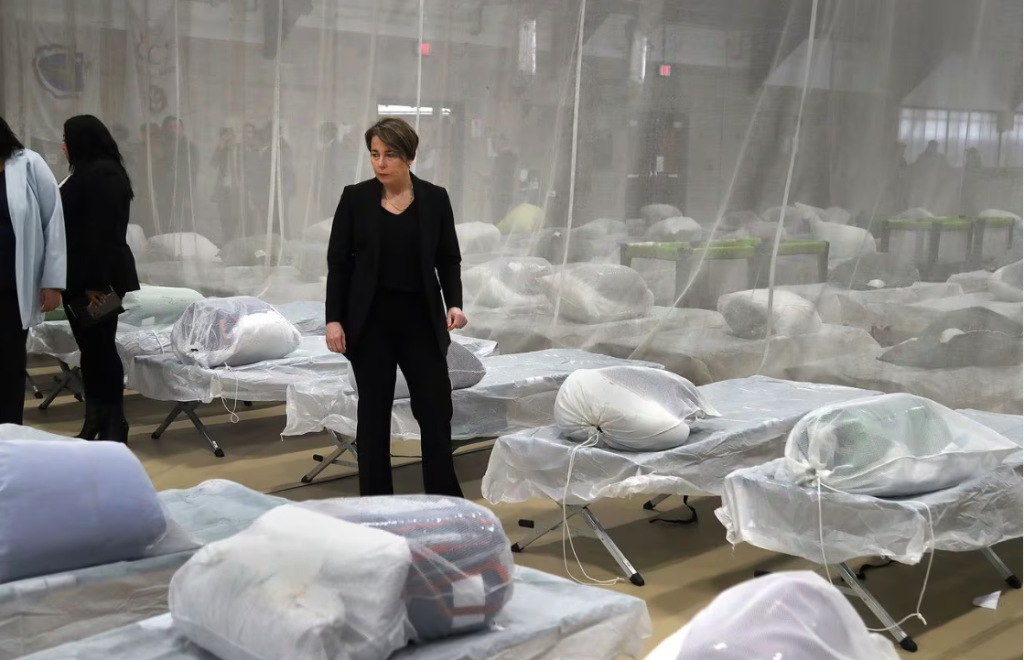【中美创新时报2024 年 3 月 25 日波士顿讯】(记者温友平编译)马萨诸塞州官员计划对居住在国营超额庇护所的无家可归和移民家庭实行 30 天的限制,要求他们每月重新申请,并表明他们也在寻求工作许可或新住房,以留在迅速扩大的计划中。对此,《波士顿环球报》记者马特·斯托特(Matt Stout)作了下述详细报道。
州长莫拉·希利 (Maura Healey)办公室周一表示,这项新任务将于 5 月 1 日生效,这只是为不堪重负的系统增加限制的一系列努力之一。立法领导人还在寻求一项提案,限制家庭在该州紧急避难所计划中停留的时间,州官员去年开始限制该州可以在酒店、汽车旅馆和其他避难所容纳的家庭数量。
希利在州议会告诉记者,情况需要改变。
“这作为一种问责手段很重要,”这位民主党人在与立法领导人会面后表示。“整个想法就是将人们从我们的紧急避难系统中转移出来,让他们走上不同的道路…… 我认为这是一项适当且负责任的措施。”
这一消息很快引起了一些移民倡导者的警惕。马萨诸塞州移民和难民倡导联盟执行董事伊丽莎白·斯威特表示,她担心新规定会给家庭带来不必要的繁文缛节,并最终迫使一些人流落街头。
斯威特说:“当移民已经在努力离开紧急避难所系统并尽快养活自己和家人时,实施最后期限解决不了任何问题。”
新要求将适用于数百个移民和无家可归家庭,他们要么目前住在罗克斯伯里和剑桥的国营收容所,要么预计住在切尔西即将开放的收容所。尽管几十年来根据该州的庇护权法保证了家庭的栖身之所,但州政府官员表示,他们无法再保证紧急庇护所系统中超过 7,500 个家庭的空间,近几个月来,这些庇护所如雨后春笋般涌现。
截至周一(25日),已有 730 多个家庭在州政府候补名单上等待庇护所计划的席位。其中 240 人住在国营的溢出点,其中大多数(总共 105 人)住在罗克斯伯里的 Melnea A. Cass 休闲中心。另有 60 人留在剑桥的溢流现场。
根据新政策,家庭必须每月重新申请,并表明他们已寻求服务以“走向独立”。据希利办公室称,这包括申请工作授权、参加工作培训计划、提交工作申请、参加英语课程或寻找住房。
州官员表示,“只要他们继续参与这些服务和活动”,家庭就可以留在溢出地点。
犹太法律与社会行动联盟主席辛迪·罗(Cindy Rowe)主张提供更多联邦资金来应对危机,她表示,她不认为新要求最终意味着许多家庭将被迫离开人满为患的避难所。
“我认为这并不像表面上看起来那么可怕或激烈,”罗在谈到新规定时说道。“我认为移民不需要鼓励来参与这些计划。”
这些变化不适用于由马萨诸塞湾联合之路 (United Way of Massachusetts Bay) 运营的所谓安全网站点,该州向该站点提供了 500 万美元资金,用于资助波士顿堡角 (Fort Point) 社区、牛顿 (Newton) 和其他地方的避难所。
希利的办公室表示,新政策也不适用于住在昆西和里维尔避难所的数十个家庭,这些避难所也为那些被认为在候补名单上具有“高优先地位”的人提供服务。例如,这包括一个有怀孕晚期孕妇的家庭。
希利说,如果一个家庭没有通过新程序重新获得认证,他们可能会失去在州紧急避难所候补名单上的位置。希利发言人后来表示,官员们仍在最终确定该政策。
“这取决于他们无法参加的原因,”希利告诉记者。“他们无法满足要求可能有充分的理由。但如果他们没有充分的理由…… 那么他们就会失去他们的位置。”
这一声明引发了倡导者的新担忧,马萨诸塞州无家可归者联盟副主任凯利·特利(Kelly Turley)称无家可归家庭的住房福利“进一步受到侵蚀”。特利表示,目前尚不清楚一个不再符合超额庇护所资格的家庭会发生什么。
“很明显,安全网确实没有安全网,”特利说。 “任何时候进行重新评估或重新认证,都可能会有家庭失去资源。”
州政府官员表示,他们还计划于四月份在前切尔西士兵之家开设另一个避难所。该场地预计可容纳大约 100 个家庭。自去年开设新的退伍军人设施以来,官员们计划拆除空置的士兵之家。
切尔西站点面向有儿童或孕妇的家庭,这些家庭有资格参加该州的紧急避难计划,但已被列入候补名单。
在马萨诸塞州,近几个月来,住房危机爆发,该州损失了数百万美元,成千上万的人为了逃离海地和委内瑞拉等祖国的暴力和经济动荡而来到该州。
截至周一,马萨诸塞州的紧急避难系统已为 7,540 个家庭提供住房,其中近 3,900 个家庭住在酒店或汽车旅馆。根据州数据,该系统中大约一半的家庭(不包括州候补名单上的数百个家庭)以移民、难民或寻求庇护者的身份进入美国。
就在几个月前的 12 月,立法者通过了一项支出法案,向该州的紧急避难系统注入 2.5 亿美元。但成本仍在继续攀升。
此后,立法者们同意通过立法向该系统注入数亿美元,这也对该计划施加了新的限制,包括大多数无家可归家庭的最长停留期限为连续九个月。
然而,众议院和参议院接受了该提案的不同版本,并且在将其发送到希利的办公桌之前仍然必须协调分歧。
参议院的提案将大多数无家可归家庭的最长停留期限限制为连续九个月,但允许某些个人多次延长 90 天,例如退伍军人、残疾儿童的单亲父母或在获得许可证方面取得进展的人 上班。
它还将允许州长花掉州托管账户中剩余的约 8.5 亿美元,其中包含去年数十亿美元盈余的剩余资金。
众议院议员在他们的法案版本中采取了更有针对性的方法,留出 2.45 亿美元的盈余收入来支付截至 7 月 1 日的财政年度的住房费用。该议院的提案还将设定 9 个月的期限,但允许 对于受雇或参加职业培训计划的人、孕妇、某些残疾人和退伍军人,再延长三个月。
众议院议长罗恩·马里亚诺周一表示,虽然他、希利和参议院议长凯伦·E·斯皮尔卡正在对该系统施加不同类型的限制,但“似乎我们都在朝着基本相同的方向前进。”
这位昆西民主党人说:“我们三个人都明白,这个计划需要限制,除非我们开始寻找控制它的方法,否则它会因自身的重量而下沉。” “只要我们继续相互交谈并继续朝着同一个方向前进,我认为我们就能解决这个问题。”
题图:一月份,莫拉·希利 (Maura Healey) 州长停下来,查看为 Melnea A. Cass 休闲中心的避难所设置的婴儿床。JOHN TLUMACKI/GLOBE STAFF
附原英文报道:
Healey to impose one-month limit on overflow shelter stays, mandate that families reapply to stay
By Matt Stout Globe Staff,Updated March 25, 2024
State officials plan to impose a 30-day limit on homeless and migrant families living in state-run overflow shelters, by requiring them to reapply monthly and show they are also seeking work authorization or new housing to stay in the rapidly expanding program.
The new mandate, which Governor Maura Healey’s office said Monday will take effect May 1, is just one in a series of efforts to add limits to an overwhelmed system. Legislative leaders also are pursuing a proposal to cap how long families can stay in the state’s emergency shelter program, and state officials last year began limiting the number of families the state can house in hotels, motels, and other shelters.
Healey told reporters at the State House that circumstances require changes.
“It’s important as a means of accountability,” the Democrat said after meeting with legislative leaders. “The whole idea of this is to divert people from our emergency shelter system, to get them on a different path. . . . I think it’s an appropriate and responsible measure.”
The announcement quickly raised alarms among some advocates for immigrants. Elizabeth Sweet, executive director of the Massachusetts Immigrant and Refugee Advocacy Coalition, said she’s concerned the new rules will create unnecessary red tape for families and ultimately, push some to the street.
“Implementing deadlines will solve little when immigrants are already striving to leave the emergency shelter system and provide for themselves and their families as quickly as possible,” Sweet said.
The new requirements will apply to hundreds of migrant and homeless families who are either currently staying at state-run overflow sites in Roxbury and Cambridge, or are expected to live at a soon-to-open overflow shelter in Chelsea. The sites have sprung up in recent months after state officials said they can no longer guarantee space for more than 7,500 families in the emergency shelter system, despite having for decades guaranteed a roof over families’ heads under the state’s right-to-shelter law.
As of Monday, more than 730 families were on a state waitlist for a spot in the shelter program. Of those, 240 were staying in state-run overflow sites, with most of those — 105 in total — living at the Melnea A. Cass Recreation Complex in Roxbury. Another 60 were staying at the overflow site in Cambridge.
Under the new policy, families must reapply monthly, and show they have sought out services to “move toward independence.” That includes applying for work authorization, participating in a job training program, submitting job applications, taking English classes, or searching for housing, according to Healey’s office.
Families will be allowed to stay at an overflow site “as long as they continue to engage these services and activities,” state officials said.
Cindy Rowe, president of the Jewish Alliance for Law & Social Action, which has advocated for more federal funding to address the crisis, said she doesn’t believe the new requirements will ultimately mean many families will be uprooted from overflow shelters.
“I don’t think it’s as dire or drastic as it might appear on the surface,” Rowe said of the new mandates. “I don’t think immigrants need encouragement to take part in these programs.”
The changes do not apply to so-called safety-net sites being operated by the United Way of Massachusetts Bay, which the state seeded with $5 million to fund overflow shelters in Boston’s Fort Point neighborhood, Newton, and elsewhere.
Healey’s office said the new policy will also not apply to dozens of families staying in overflow shelters in Quincy and Revere, which also serve those considered to have “high priority status” on the waitlist. That includes, for example, a family with an expecting mother in her third trimester of pregnancy.
Healey said if a family isn’t recertified through the new process, they could lose their spot on the state waitlist for emergency shelter. A Healey spokesperson later said officials are still finalizing the policy.
“It depends [on] why they’re not able to participate,” Healey told reporters. “There could be a good reason why they’re not able to fulfill what are requirements. But if they don’t have a good reason . . . then they will lose their slot.”
The announcement sowed new concerns with advocates about what Kelly Turley, associate director of the Massachusetts Coalition for the Homeless, called the “further erosion” of shelter benefits for homeless families. Turley said it was not immediately clear what will happen to a family who no longer qualifies for an overflow shelter spot.
“It’s become clear there really isn’t a safety net to the safety net,” Turley said. “Anytime there’s a reevaluation or a recertification, there may be families who lose access to resources.”
State officials said they also plan to open another overflow shelter in the former Chelsea Soldiers’ Home in April. The site is expected to hold roughly 100 families. Officials have planned to demolish the vacant soldiers’ home since opening a new veterans facility last year.
The Chelsea site is intended for families with children or pregnant women who are eligible for the state’s emergency shelter program, but have been placed on the waitlist.
In Massachusetts, the shelter crisis has flared in recent months, costing the state millions as thousands more people arrive in the state, fleeing violence and economic turmoil in their home countries, including Haiti and Venezuela.
As of Monday, Massachusetts was providing housing for 7,540 families in its emergency shelter system, including nearly 3,900 in hotels or motels. Roughly half of the families in the system — not counting the hundreds more on the state waitlist — entered the United States as migrants, refugees, or asylum seekers, according to state data.
Just months ago, in December, lawmakers passed a spending bill that infused $250 million into the state’s emergency shelter system. But the costs continue to climb.
Lawmakers have since embraced pouring hundreds of millions more into the system through legislation that would also impose new limits on the program, including a maximum stay for most homeless families to nine consecutive months.
The House and Senate, however, embraced different versions of the proposal, and still must reconcile the differences before sending it to Healey’s desk.
The Senate’s proposal would limit the maximum stay for most homeless families to nine consecutive months, but allows for multiple 90-day extensions for certain individuals such as veterans, single parents of children with a disability, or people who have made progress toward receiving a permit to work.
It would also allow the governor to spend the roughly $850 million left in a state escrow account that contains the remnants of last year’s multibillion-dollar surplus.
House lawmakers took a more targeted approach in their version of the bill, setting aside $245 million in surplus revenues to pay for shelter costs through the fiscal year, which ends July 1. That chamber’s proposal would also set a nine-month limit, but allow another three months to those who are employed or enrolled in a job training program, pregnant women, people with certain disabilities, and veterans.
House Speaker Ron Mariano said Monday that while he, Healey, and Senate President Karen E. Spilka are pushing different types of limits on the system, “it seems as if we’re all going in basically the same direction.”
“All three of us understand that this program needs constraints, that it will sink under its own weight unless we begin to look at ways in which we can control it,” the Quincy Democrat said. “As long as we keep talking to each other and keep moving in the same direction, I think we’ll be able to navigate this.”

